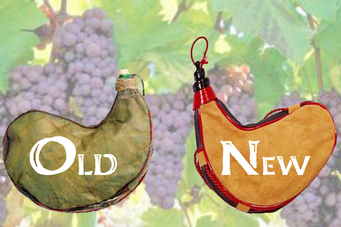 I am on a bus to Bulgaria, where Lisa and I will be leading the staff and board of the IFES movement there through a strategic planning process. This process involves bringing the team together to consider the challenges and opportunities, the needs and the assets of the movement and to consider how best to prepare and plan for growth in the coming few years. When we did this in Ukraine, we began with a few touchstone Bible studies. First, we looked at the passage in 2 Kings 4:1-7 where Elisha solves a widow’s problem of poverty by asking her to gather as many jars as she can from her neighbors, and then to take the jar of oil she has in her house and begin pouring oil into the many empty jars. The oil kept pouring while there were empty containers, and it stopped when they were all full. We looked at this story as a parable, as a model of how God often works, rather than as some sort of promise, but we did notice that God multiplied her oil in proportion to the number of jars she had faith and resources to borrow. If she had only borrowed a few jars, she would only have seen a small miracle. The jars are simply containers, much like the structures and plans we make in student ministry. We don’t, at the end of the year, care about the number of Bible studies we led or conferences we planned and executed, but we care deeply about the number of students who entered the Kingdom or the measure of their growth in faith as disciples. But we know in Jesus’ stories about how the kingdom of God works, that growth is something given by God, and the farmer who sows the seed “knows not how”. So the best we can do, to prosper the ministry God has entrusted to us, is to set out jars, opportunities for God to pour out the oil of his Spirit, the work of his Spirit in the lives of students, who will find these “jars”, these Bible studies, conferences, student leaders who serve, invite, welcome and encourage, so that God can bring about miraculous growth, both in individual students and in the size and strength of the fellowships themselves. A second passage we looked at is Mark 2:18-22, another relatively obscure little parable about containers. Jesus is asked a question about the practices of his disciples: It seems religious people in Jesus’ day fasted a lot, but Jesus’ disciples didn’t. He certainly seemed like a religious person, but why didn’t his group fast? Jesus explains that it is foolish to try to patch old practices on new movements of God’s Spirit—the new will destroy the old, whether with new patches on old cloth, or new wine in old wineskins. The Pharisees were once a reform movement within Judaism, calling people not to turn away from God, the scriptures, and the temple. But 150 years later, they were a part of the religious establishment. What had once been fresh wine of renewal put in new wineskins of faithful zeal became over time the old and crusty wineskins, empty of the Spirit of God and devoid of real faith. These, in turn, needed to be replaced by new wine of the Kingdom poured into fresh wineskins. Unfortunately, this pattern has repeated itself many times in the history of the people of God, right up until the present. What begins as a renewal ministry, a fresh outpouring of God's spirit, becomes rigid and stale as it is multiplied through succeeding generations. This process, which might take decades in the church, can take just months or a couple years in student ministry—what was once an innovative risk into which God was pleased to pour out his Holy Spirit and work through his people becomes an old encrusted wineskin that no longer has the impact in student ministry it once did. The call of this passage is to be seeking a fresh outpouring of God’s Spirit, and to be creative enough to prepare new skins for God’s purposes with students. This passage calls us to look at the structures and strategies of the past and to honestly evaluate them based on the growth we see them bringing about through the outpouring of God's Spirit. Structures that served well in the past may no longer be fruitful, and it is then time to prepare new structures better fit for today's challenges and the work of God we desperately need. These two passages are not so much about the goals of student ministry but the process, which involves preparing structures into which God will be pleased to bring about growth, and to trust, not in those structures or time-tested strategies, but in the God who is always eager to work in new ways to draw people to himself.
1 Comment
 Today we left one of our “homes” to move on to another, the 88th time we have done so. As with most of those homes, the departure meant boarding public transportation, often a plane though in this case it was a bus. And, at most of these departure points, I notice something. Specifically, I notice the couples who are saying goodbye. One member of the couple is about to board a bus, a train or a plane, while the other is staying behind. Often these are young couples, but not always. I do not know the story behind each of these sweet partings, but we have heard many stories. We have heard from people of their family members leaving their homes in Eastern Europe or the former Soviet Union for economic reasons. We have heard from people whose fathers moved to Russia, usually Moscow, staying away sometimes for years in order to make enough money to support the family. We have even heard of a couple who left their young children in the care of a brother and his wife so they could get jobs in Russia to support their family. As we hear these stories, it is difficult to judge and easy to have compassion on the people who have made this most painful of decisions in order to pursue economic support for their loved ones at great personal cost. Of course, I do not know the story of everyone I see saying their farewells at the platform or as we enter passport control or the security line. Long distance relationships for young people can be character building and can build the basis for a stable marriage relationship long term. (Both of our children are in such long-distance relationships now and experience the heartache of having to say goodbye at the airport when one returns to their home.) And during my career with IVCF, I was often the one leaving my wife and family to board a plane for some days of separation in order to pursue my ministry calling. But this year, I remain grateful that, at each point of departure, I am not saying goodbye to my sweetie, my best friend, but I am traveling with her, leaving one “home”, one set of friends, with my partner in this ministry in order to embrace the next step in the adventure, a new “home” and a new set of friends and experiences. I am grateful for this treasured companionate faith journey with Lisa. * No, we are not in our own home and will not be until November... We are now in Bulgaria... :)  Mount Olympus, 50 miles from our hotel Mount Olympus, 50 miles from our hotel Good question! It was a surprise to us, too. Our schedule took an unexpected turn last week. We were in Vilnius, Lithuania, scheduled to fly to Norway to see friends we’d made along the way. But the travel times of our trip made our meeting our friends impossible, and we found ourselves staring at expensive hostel housing, and expensive airfare to our next ministry commitment in Sofia, Bulgaria, all for the one two-hour meeting that remained in our schedule there. Rich said aloud, the night before our flight, “I wish we weren’t going to Norway. It’s going to be so expensive.” I said, “Shall we cancel?” He mused, “What if we bussed down to Bulgaria, and just overshot it by a few hours. We’d be in Greece!” So, after a flurry of internet research and e-mails cancelling flights, at 10pm the next night we boarded a bus, and after 36 rather longish hours on buses and trains, we arrived in Northern Greece, at a savings of hundreds of dollars. We’re in a budget hotel in a budget town, surrounded by happy Russians and Serbians on holiday. We’re enjoying the beach, but also getting in some prep for the final three events in our schedule, which are as follows:
Prayer Requests: Please pray that our stamina and motivation to serve students and staff would remain strong for this final stretch. We feel so grateful for this few days in a restful town here in Greece; after recovering from the crazy bus ride we feel rested and energized for these last three stops. Pray that we would connect well with the non-Christian students at the English camps, and that they would take steps toward following Jesus. Please pray for our transition to Southern California. We return with no cars, and you who live in LA know that it is sadly not an easy city to navigate without a car. We are grateful for the loaners that are beginning to come into place and the possibility of one longer-term. Anyone looking to sell a used car at a good price is encouraged to contact us! Our housing is another challenge, but we see God’s provision there as well. We will stay in the missionary housing of the Presbyterian Church, House of Rest, in Pasadena for our first three months back, and look forward very much to returning to our home in November. Pray as well for our return to work: Rich will begin work right away at Tanner, and I will have one course to teach at Fuller each quarter. I will be recertified to host a person with disabilities again in our home and to tutor. I continue to hope to be in pastoral ministry, and applied to another church this morning, but search processes are slow and jobs scarce, so I will do the work that I can do in the meantime. We also are quite excited to have both our children in Pasadena with us for ten days (Mark) and three weeks (Becca) before Becca heads off for a semester abroad in Pune, India and Mark returns to London. Pray that in the midst of all the details of renewing expired driver’s licenses, renegotiating our insurance, and remembering how to cook food, we would have time to process all that we have learned and experienced this year. We continue to be so, so grateful for the gift and opportunity it has been, and so thankful to you who have given and prayed along the way!  How important is food autonomy to you? How important is it that you can eat what you want when you want it? How much does having choice about what you eat, its variety and/or consistency and quantity, matter to you? Well, until this year, I (Rich) would have said that it matters to me a lot. I like food, but I am not an omnivore—I would have said that I am a bit of a picky eater. Of course, that has mellowed over the course of my life, but I am still not a huge salad fan, for example, and I avoid salad dressings and most sauces if I can help it. When you become a missionary, especially one that is traveling to one hundred or so homes over the course of a year, you end up letting go of food autonomy. We have been served hundreds of meals over the last 11 months, many of them in small conference facilities, but also in homes where we were being served as guests. Over the last year, we have been on our own and not serving a local student movement for just a few weeks. Other than that, we have eaten out at restaurants rarely, and then mostly local places offering local food choices. I am not complaining about the food we have enjoyed on this trip—far from it. Actually, if anything, it has surprised me how much I have enjoyed the food and really not missed being able to make or select my own meals. We have eaten what is set before us, usually pretty happily, and really only a few times has the meal been difficult to consume. But I notice what I think now of as my Americanness by how I notice the much reduced set of choices we have, in part because we are enjoying the hospitality of others and in part because of the post-soviet mindset of the people here. In the US, even at relatively simple conference facilities, usually there would be some choice of food:
Again, my intent here is not to complain about the lack of variety in the food here, but simply to marvel at what people expect even nearly 25 years after the fall of the Soviet-imposed uniformity. Today, I was at a restaurant with a group of people from the church Lisa preached at this morning. One American couple was sitting across from me. They had both ordered salads for lunch, and the wife had ordered a side of French fries. Her 10-year-old son had ordered a soup, but after he finished his soup, he reached for his mom’s fries. She gently swatted his hand away, saying, “You could have ordered anything.” She was defending her (still nearly full) plate of French fries from her son. In my experience this is not a very typical mom’s response to a son’s request to share his mom’s fries. She then relented and let her son have a single French fry off her plate. I am sure she is a wonderful and loving mom, but my theory is that she had simply been craving French fries, and she was seeing that plate of fries as the pathway to satisfy her food craving. Even her love for her son was not going to get in the way of the satisfaction she sought. So perhaps this is a common occurrence when one lives as a missionary in a foreign land. I have compassion on her—I myself become territorial about food, and even about French fries specifically, especially if I am seeking to restore some lost food autonomy. I have found a very important coping strategy. I travel, as I have for many years, with dark chocolate, and I usually eat about one ounce of dark chocolate, in small pieces, per day. It helps me not to complain about the lack of chocolate in my host-provided diet, and in general helps me to be content, as the Apostle Paul says, whether I am experiencing plenty or want. I wish I weren’t dependent on dark chocolate in this way, but as a coping strategy, it is better than taking up smoking! So the next time you open your refrigerator and see dozens of choices of food you can happily prepare and consume, or go to a buffet at a restaurant or even a weekend church retreat, stand back, be amazed and grateful, and recognize that most of the people on the planet wouldn’t dream of the choices you have. (And, if you travel, figure out what is your affordable coping strategy that allows you to be content in all circumstances.) |
Archives
April 2024
AuthorRich and Lisa Lamb Categories |
 RSS Feed
RSS Feed